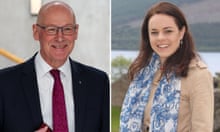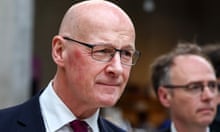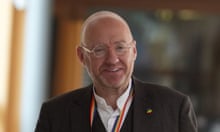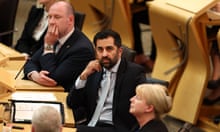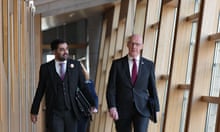Humza Yousaf could be forced to quit as Scotland’s first minister after the Scottish Greens announced they would back a motion of no confidence against him at Holyrood.
The Scottish National party’s former coalition partners declared they would vote next week against the man who had “betrayed” them, hours after he unilaterally ended their power-sharing deal.
Yousaf stunned allies and opponents on Thursday morning by announcing he was suddenly axing the arrangement with the Greens signed by Nicola Sturgeon in 2021, hailed then as a new era in consensus politics.
He called in Patrick Harvie and Lorna Slater – the Scottish Greens’ co-leaders and junior ministers in his government – early in the morning to tell them they had been sacked and that he was ripping up the agreement.
The move – quickly denounced by Harvie and Slater as “cowardly” and “weak” – followed mounting anger within the SNP about a host of electorally unpopular policies that Yousaf’s internal critics believe have been forced on the party by the Bute House coalition agreement.
His decision was then rubber-stamped by an emergency cabinet meeting, with Harvie and Slater absent, at 8.30am, triggering a dramatic series of events that culminated in the Greens announcing they would support a Conservative no confidence motion scheduled for next week.
“It is very clear that Humza Yousaf has decided to burn his bridges with a progressive pro-independence majority that was established by the Bute House agreement,” Harvie told BBC Radio Scotland.

That brings Yousaf, who only became first minister in April 2023, to the brink of defeat, forcing him into a series of deals with his internal critics, seven of whom rebelled in a parliamentary vote earlier this week, and his nationalist rivals in the centre-right Alba party set up by Yousaf’s fiercest critic, the former SNP first minister Alex Salmond.
The SNP is two votes short of a majority at Holyrood. Yousaf now has to rally every vote from his deeply split party and secure the backing of a former SNP minister, Ash Regan, who defected to Alba last October in protest at the SNP’s stance on gender reform and its soft-pedalling on independence.
If the result is tied, Holyrood’s presiding officer, Alison Johnstone, a former Green MSP, will have to make a casting vote in favour of Yousaf, under a protocol that presiding officers vote for the status quo.
Holyrood officials made clear that as the vote is not binding, under the Scottish parliament’s rules it would be up to the first minister to decide how to respond. However, losing a vote of no confidence so close to a general election in which the SNP could lose dozens of seats to Labour could make his position untenable.
Harvie and Slater later told reporters at Holyrood they could not envisage working with Yousaf on new policies or legislation after his earlier betrayal.
Harvie said the full Scottish Greens parliamentary group had decided unanimously to support the no confidence motion, albeit with a “heavy heart”, adding that Yousaf had chosen to “capitulate” to socially and economically conservative voices in the SNP.
He added that the Bute House agreement had been a confidence and supply arrangement with very clear processes for sorting out policy disagreements. However, he said Yousaf “chose to rip it up, and that can’t be consequence-free”.
Slater said: “When we voted for Humza Yousaf’s appointment last year, it was on the basis that we would continue to work together to deliver the progressive policy programme as laid out in the Bute House agreement.
“[His] decision today to end that agreement has without doubt called into question the delivery of that programme. It came with no reassurance that his minority government would continue with these objectives. And it abruptly ends the pro-independence majority government which the public voted for, and which members of both parties supported.”
The catalyst for the crisis had been his government’s decision last week to abandon its “world-leading” target to cut Scotland’s carbon emissions by 75% by 2030, a move that provoked an open rebellion by Scottish Green party members.
That rebellion in turn forced Harvie and Slater to agree to an emergency vote by the Scottish Green party on staying in government – a concession that rattled Yousaf and immediately raised questions about the coalition’s viability.
The first minister, who is facing the loss of dozens of seats to Labour in the general election, said after the cabinet meeting on Thursday that the Bute House agreement had “served its purpose”. It had come to “its natural conclusion” and no longer gave his government the stability it needed, he said.
He made clear the SNP would soon abandon or water down some policies it had previously championed, now that government policy was no longer framed by the agreement.
“We will of course have to be very wise and careful around the battles that we choose to fight, and we will be absolutely and entirely focused on the people of Scotland’s priorities,” he said.
The first minister insisted he was proud of what the coalition with the Greens had achieved, including nationalising rail services, taking 100,000 children out of poverty, bolstering green energy production and cutting taxes for the poorest.
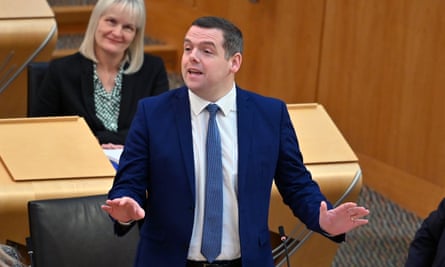
However, later, during a fractious and rowdy session of first minister’s questions at Holyrood, it became clear Yousaf’s government faced much greater instability.
Labour used the session to call for a snap Holyrood election. Douglas Ross, the Scottish Conservative leader, then announced that the Tories would be tabling the vote of no confidence. Yousaf was “not fit for office”, Ross said. “We said at the beginning this was a coalition of chaos and it has ended in chaos.”
Speaking as a backbench MSP for the first time in nearly three years, Harvie accused the first minister of caving in to rightwing forces in Scottish nationalism and in parliament. He named Salmond, who is widely believed to be orchestrating attacks on Yousaf’s leadership; Fergus Ewing, the most vociferous SNP critic of the Greens deal; and Ross.
“Who does the first minister think he has pleased most today – Douglas Ross, Fergus Ewing or Alex Salmond? And which of them does he think he can rely on for a majority in parliament now?” Harvie asked.
He dismissed Yousaf’s assurances earlier in the day that he still wanted to collaborate with the Greens on climate policy, fair taxation and anti-poverty measures.
“That has significant consequences for how the Scottish Greens position ourselves in parliament, and the first minister cannot rely on Green support while being dictated to by forces on the right,” Harvie said.


